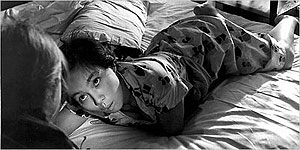
The Insect Woman

THE INSECT WOMAN (MOVIE)
Nikkatsu
Original release: November 16th, 1963
Running time: 123 minutes
Country of origin: Japan
Original language: Japanese
Director: Shohei Imamura
Writers: Keiji Hasebe, Shohei Imamura
Cast: Sachiko Hidari, Kazuo Kitamura, Jitsuko Yoshimura

I’m sure I can include myself in a majority group of those who would comfortably say that life can be a bumpy ride. Stress and pressure sometimes come from multiple directions all at once; a falling out, struggling to find a career, financial problems with many subcategories and endless other things that I forget to mention right now. All of these have piled up in ways at times that I felt I could switch lives with just about anybody and be in a better place than in my own skin. It’s good to put things into perspective sometimes.
Shohei Imamura’s The Insect Woman is a prime candidate to do just that, it would probably serve as an eye-opener to most who might be a little bit too involved in their own everyday struggles. The reason I felt humbled in this way by the film is its ambitious telling of almost an entire lifespan from birth to an old age. We follow Imamura’s heroine Tome (Sachiko Hidari) as she attempts to overcome life’s very many obstacles before, during and after WWII. She has an eventful but difficult life that begins with an uncaring mother and a stepfather Chuji (Kazuo Kitamura) who’s such a puzzling character that I’m still just trying to wrap my mind around it. It’s obvious that he has a very unhealthy relationship with his step-daughter and later continues this behaviour with her daughter Nobuko (Jitsuko Yoshimura) when Tome decides to leave town for Tokyo to try her luck there.

It’s never made clear if Chuji has intercourse with Tome but their relationship is shown to be sexual in really bizarre ways, like Tome breastfeeding her stepfather when her new-born baby doesn’t want her milk. With Chuji also showing signs of mild mental retardation, this relationship is just about the strangest one I’ve ever seen in film. Imamura nevertheless portrays it as a loving one throughout so I’ll just let you watch the film and make your own judgement.
When Tome moves to Tokyo she ends up in a brothel after a few misadventures – including having a child die in an accident under her care – where she makes the inevitable journey from maid to prostitute. This is the period where we begin to see Tome as a tough and even cruel person who’s willing to get people out of her way to get what she wants. With that, she soon takes over the brothel and begins to run it using her previous experience as head of a labour union.
While becoming a savvy business woman, she’s also bitter and greedy by now, leading her to the downfall that usually comes with such traits. When her daughter Nobuko – now a young woman  – visits her in Tokyo, it looks like she’s about to make the same mistakes as her mother did, succumbing to the sexual exploits of rich men; a life that Tome could never find her way out of.
– visits her in Tokyo, it looks like she’s about to make the same mistakes as her mother did, succumbing to the sexual exploits of rich men; a life that Tome could never find her way out of.
It may seem like I revealed much of the plot here, but it’s not the case; Imamura did quite a remarkable job in telling the story of an entire life with all of its complexities and pitfalls. For a film that embraces such a timespan, it’s inevitable that we occasionally find ourselves in completely new situations when there’s a jump in the narrative, but I think The Insect Woman has a little bit more than just that.
It often felt like the director made a deliberate choice to give the film an abstract feel by not explaining what is happening, instead we can gradually ‘catch up’ while something is already taking place. A few historical events are shown for instance like “Bloody May Day” and the “Days of Rage & Grief” without being directly addressed, so have your Google ready if you want to fully understand the context. Needless to say that this somewhat convoluted story-telling style makes The Insect Woman at times difficult, but ultimately a rewarding experience.

Arpad Lukacs
Arpad is a Film Studies graduate and passionate photographer (he picked up the camera and started taking stills just as he began his studies of moving pictures). He admires directors that can tell a story first of all in images. More or less inevitably, Brian De Palma has become Aprad’s favourite filmmaker.
Then there’s Arpad’s interest in anime. He was just a boy when he saw Nausicaä of the Valley of the Wind on an old VHS and was hypnotised by the story of friendship, devotion and sacrifice. He still marvels at the uncompromising and courageous storytelling in Japanese anime, and wonders about the western audience with its ever growing appetite for “Japanemation”.
Have a look at Arpad's photography site, and you can follow him on Twitter @arpadlukacs.
© 2022 STATIC MASS EMPORIUM . All Rights Reserved. Powered by METATEMPUS | creative.timeless.personal. | DISCLAIMER, TERMS & CONDITIONS
HOME | ABOUT | CONTACT | TWITTER | GOOGLE+ | FACEBOOK | TUMBLR | YOUTUBE | RSS FEED
CINEMA REVIEWS | BLU-RAY & DVD | THE EMPORIUM | DOCUMENTARIES | WORLD CINEMA | CULT MOVIES | INDIAN CINEMA | EARLY CINEMA
MOVIE CLASSICS | DECONSTRUCTING CINEMA | SOUNDTRACKS | INTERVIEWS | THE DIRECTOR’S CHAIR | JAPANESE CINEMA





